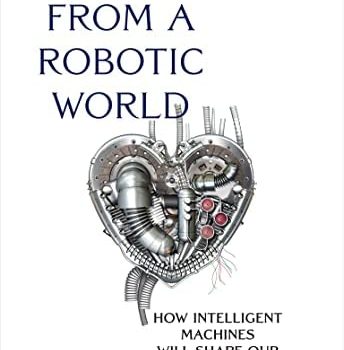Caren Gussoff Sumption Reviews Tales from a Robotic World: How Intelligent Machines Will Shape Our Future by Dario Floreano & Nicola Nosengo
 Tales from a Robotic World: How Intelligent Machines Will Shape Our Future, Dario Floreano & Nicola Nosengo (MIT Press 978-0-26204-744-9, $24.99, 280pp, hc) September 2022.
Tales from a Robotic World: How Intelligent Machines Will Shape Our Future, Dario Floreano & Nicola Nosengo (MIT Press 978-0-26204-744-9, $24.99, 280pp, hc) September 2022.
I love robots. From Roombas to Twiki, the Boston Dynamic dance crew to Awesom-O 4000, the Mars Rover to Marvin: I am a fan of both true technological wonders and kitschy speculation, a true believer in the infinite possibilities autonomous machines can bring to humanity in the next few decades. I should, therefore, be the perfect audience for Tales from a Robotic World: How Intelligent Machines Will Shape Our Future, the new book by Dario Floreano & Nicola Nosengo.
Tales from a Robotic Future is full of exciting promise: to show, through both exposition and story, the various ways in which robots could deliver on those infinite possibilities, and assist us in combating the effects of climate change, to provide inexpensive and accessible healthcare, and, of course, to relieve humans of the various tasks and jobs that are hazardous and/or numbingly repetitive. And the authors are well qualified to take us through such scenarios; they are both brilliant researchers, deeply embedded in the most cutting-edge robotics work happening today (Floreano is a writer and the director of Intelligent Systems at the Swiss Federal Institute of Technology Lausanne, better known as EPFL, and Nosengo is the chief editor of Nature Italy, as well as a writer at EPFL).
The book, while wildly interesting in parts, falls short of its promise, perhaps a victim of its own ambitions. By trying to do two things simultaneously and well, it does service to neither, and makes this reader wish the authors had made some different decisions. The topics covered are relevant, and interesting, and they cover a lot of ground. For instance, it opens with a speculative story of future Venice, and how climate change has challenged the city’s most famous canals. Flooding constantly threatens residents. But swarm robotics, with their ability to be both flexible in implementation and united in a common goal, roam the waters around the city, and, when needed, can quickly form dams and barriers – holding back and redirecting floodwaters. The authors intersperse the story with exposition about actual researchers working with swarming robots (interestingly, much work has been driven by biologists, observing animals with such behavior, like insects or migrating birds).
For all but the last few chapters, the book progresses this way: alternating story with explanation and clear, cogent reporting on current research. The authors touch on many of the big ideas for robots, such as mitigating natural disaster scenarios; being sent to space (say, to Mars) to prepare for human arrival by building structures or preplanting crops; to reduce traffic congestion in cities; to act as human companions, or the proverbial ‘‘sexbot’’; to assist in tricky surgeries or provide other medical care; and to join the workforce in factories or other industrial fields. In every instance, the reportage is strongly written, while the fiction is…not. In the introduction, the authors front-load an apology and acknowledgement that they’re not science fiction writers – so we know that Floreano and Nosengo are aware of their own shortcomings. So, why did they not take the extra step and solicit stories from experienced SF authors?
There’s no shortage of amazing fiction writers, and, among those, no lack of great writers who work with these ideas. This is an otherwise polished book, written by two experts, and published by a well-known and established press. It’s mystifying, because, in all honesty, the fiction is the downfall of what could have been an amazing book. It’s additionally sad because it’s easy to see what the authors were trying to accomplish. The fiction could have – should have – been the element that made such heady research feel personal. Done well, it would have added an emotional layer to the work, but as is, the fictional elements are skippable at best, and distracting at worst.
The last few chapters, however, do quite an admirable amount of work. The authors are well versed in those emotions around robotics, and spend time here addressing the challenges and problems with them, especially examining the fears and ethical conundrums inherent in creating intelligent machines. It looks at things humans will have to contend with, such as legislation and definition of personhood, as the technology develops. In fact, the last few chapters are so elegantly and insightfully written that it makes me further mourn the earlier chapters, wistful for what could have been.
Overall, Tales from a Robotic World is an uneven read that really is worthwhile only for the deep dive into complex research and issues explained masterfully by two experts.
Caren Gussoff Sumption is a writer, editor, Tarot reader, and reseller living outside Seattle, WA with her husband, the artist and data scientist, Chris Sumption, and their ridiculously spoiled cat-children.
Born in New York, she attended the University of Colorado, the School of the Art Institute of Chicago, Clarion West (as the Carl Brandon Society’s Octavia Butler scholar) and the Launchpad Astronomy Workshop. Caren is also a Hedgebrook alum (2010, 2016). She started writing fiction and teaching professionally in 2000, with the publication of her first novel, Homecoming.
Caren is a big, fat feminist killjoy of Jewish and Romany heritages. She loves serial commas, quadruple espressos, knitting, the new golden age of television, and over-analyzing things. Her turn offs include ear infections, black mold, and raisins in oatmeal cookies.
This review and more like it in the January 2023 issue of Locus.
 While you are here, please take a moment to support Locus with a one-time or recurring donation. We rely on reader donations to keep the magazine and site going, and would like to keep the site paywall free, but WE NEED YOUR FINANCIAL SUPPORT to continue quality coverage of the science fiction and fantasy field.
While you are here, please take a moment to support Locus with a one-time or recurring donation. We rely on reader donations to keep the magazine and site going, and would like to keep the site paywall free, but WE NEED YOUR FINANCIAL SUPPORT to continue quality coverage of the science fiction and fantasy field.
©Locus Magazine. Copyrighted material may not be republished without permission of LSFF.








